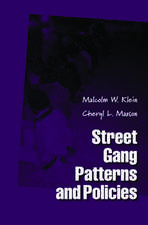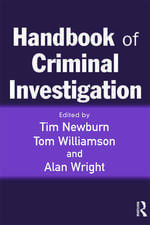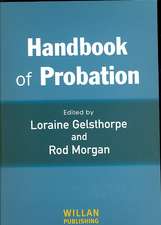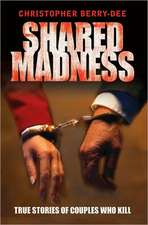Behavioural Analysis of Crime: Studies in David Canter's Investigative Psychology: Psychology, Crime and Law
Editat de Donna Youngsen Limba Engleză Paperback – 28 sep 2013
| Toate formatele și edițiile | Preț | Express |
|---|---|---|
| Paperback (1) | 439.91 lei 3-5 săpt. | +24.07 lei 7-13 zile |
| Taylor & Francis – 28 sep 2013 | 439.91 lei 3-5 săpt. | +24.07 lei 7-13 zile |
| Hardback (1) | 764.20 lei 6-8 săpt. | |
| Taylor & Francis – 28 sep 2013 | 764.20 lei 6-8 săpt. |
Preț: 439.91 lei
Preț vechi: 478.16 lei
-8% Nou
Puncte Express: 660
Preț estimativ în valută:
84.18€ • 88.07$ • 69.93£
84.18€ • 88.07$ • 69.93£
Carte disponibilă
Livrare economică 12-26 martie
Livrare express 26 februarie-04 martie pentru 34.06 lei
Preluare comenzi: 021 569.72.76
Specificații
ISBN-13: 9780754626282
ISBN-10: 0754626288
Pagini: 326
Ilustrații: Includes 28 b&w illustrations
Dimensiuni: 153 x 219 x 21 mm
Greutate: 0.54 kg
Ediția:New ed
Editura: Taylor & Francis
Colecția Routledge
Seria Psychology, Crime and Law
Locul publicării:Oxford, United Kingdom
ISBN-10: 0754626288
Pagini: 326
Ilustrații: Includes 28 b&w illustrations
Dimensiuni: 153 x 219 x 21 mm
Greutate: 0.54 kg
Ediția:New ed
Editura: Taylor & Francis
Colecția Routledge
Seria Psychology, Crime and Law
Locul publicării:Oxford, United Kingdom
Cuprins
Contents: Editor’s notes; Investigative psychology: David Canter’s approach to studying criminals and criminal action, Donna Youngs; Section 1 On David Canter’s IP Theories and Models: Violent self-narratives and the hostile attribution bias, Shadd Maruna and Michelle Butler; Action systems models of criminal differentiation, Katarina Frizton; Differentiation of hostage barricade incidents: through the application of the action system model, Kaeko Yokota; Test of Canter’s sexual behavioural models in a sample of young people who had sexually harmed, Louise Almond; Emotions as explanation of crime, Maria Ioannou. Section 2 On David Canter’s IP Methodologies: Introducing a common range index of inter-variable similarity for the analysis of Radex structures, Sean Hammond; Homicide crime scene analysis: an investigative psychology approach, C. Gabrielle Salfati; Investigative psychology and suicide: the facet structure of investigative material, Susan Giles; Questions and answers about the faceted analysis of criminal actions, Jamie Lee. Section 3 IP: A Problem-Solving Discipline: Offenders' spatial behaviour and geographical offender profiling, Laura Hammond and Donna Youngs; Linking crimes in criminal investigations, Craig Bennell; Contemporary challenges in investigative psychology: revisiting the Canter offender profiling equations, Donna Youngs and Elizabeth Spruin; Closing remarks, David Canter. Section 4 Selected IP Works of Professor Canter: Geographical offender profiling: using insights from practical application to enhance theoretical explorations, David Canter; Evaluating profiling; Narratives of criminal action and forensic psychology, David Canter and Donna Youngs; Selected writings for UK newspapers; Selected bibliography; Index.
Notă biografică
Dr Donna Youngs is a reader, University of Huddersfield, UK. She works closely with David Canter on the Centre's research programme looking at crime and criminal behaviour.
Recenzii
'... Youngs has edited a collection of clear, concise studies situating Investigative Psychology as a field of applied research making groundbreaking contributions to the study of crime and criminal behavior.' International Criminal Justice Review ’I enthusiastically recommend this discussion of the science, philosophy and style of behavioral analysis pioneered by the unique vision and drive of David Canter and Donna Youngs, herself. In particular, I have found their concept of narrative identity and "personal myth" as it relates to criminal behavior extremely useful in defining the underlying principles to what I actually do in my own work every day.’ Kathleen M. Puckett, former FBI Special Agent, TK Associates, LLC, USA
Descriere
Studies in investigative psychology require a special methodology, developed by David Canter to allow scientific explorations in such a challenging field, previously assumed not to be open empirical study. In this book the practical potential and applications of the research are given, as well as a selection of commentaries on the cutting edge debates that are driving the future of the investigative psychology. This new discipline is of relevance to forensic psychologists in many different settings, criminologists and law enforcement agencies, bringing together work that lays out current achievements and sets the agenda for future research in the field.



















